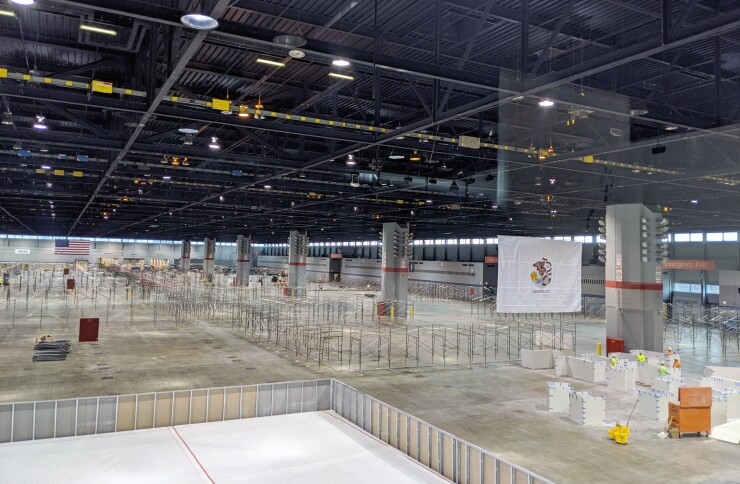The public agency that manages Chicago’s convention center campus expects to draw from state sales taxes to fully cover debt service this year and will return to the market for more debt restructuring this summer as the pandemic’s fiscal toll mounts.
The Metropolitan Pier and Exposition Authority relies on revenue from events at McCormick Place — still halted amid the COVID-19 pandemic — and taxes on tourism and entertainment-related activities that have been severely stung by the coronavirus.
The authority will likely require a $15 million draw this year on the state sales tax backup pledge to cover debt service on its bonds. It’s been at least a decade since MPEA triggered such a draw.

“Unfortunately for fiscal 2021 while the authority
The agency believes it can repay the draw in three years based on projected tax collections.
“In anticipation of the adverse impact of COVID-19 on authority tax collections, the authority anticipates completing a refinancing during fiscal 2022 that will significantly reduce the fiscal 2022 debt service to be more in-line with our expected authority tax collections,” Bormann said. Both the MPEA and state operate on a fiscal year calendar that begins July 1.
The authority hasn’t finalized the borrowing plans but is legally allowed to refinance nearly $147 million in fiscal 2022 debt service. Bormann said the timing is not yet certain but the agency is eyeing a summer sale.
The agency has seen 223 events canceled, although 65% have been rescheduled. The losses amount to an estimated $3 billion economic impact from the loss of 3.4 million attendees and 2.2 million hotel night stays, MPEA Chief Executive Officer Larita Clark told lawmakers.
“The impact of COVID has been devastating on McCormick Place and our entire campus. We have not hosted an event or trade show on this campus since March of 2020,” Clark said at the hearing.
The agency is seeking $30 million to $55 million in fiscal 2022 subsidies. That includes a $15 million operating subsidy for fiscal 2022 if operations resume by July. That amount could grow to $40 million if the pandemic’s course delays the resumption of shows.
In addition, the agency is asking the state to approve Senate Bill 1850 that reinstates a $15 million annual incentive grant appropriation to help draw business by lowering costs for clients. The reinstatement authorization runs from fiscal 2022 through fiscal 2026. Through fiscal 2023, the authority is asking for authorization to use a portion of the incentive grants to reimburse events for costs associated with the mitigation of COVID-19.
The agency in recent years had not sought the subsidy instead, using profits from the newest of the two hotels it owns to cover incentives. “These grants allow us to be on a level playing field with our competition,” Clark said.
The authority last September sold $161 million of
The bonds carry a BBB rating from S&P Global Ratings with a stable outlook, a rating capped due to the state's BBB-minus rating because of the need for a state appropriation for debt service. S&P recently revised the state’s outlook to stable and that also moved MPEA’s outlook to stable from negative.
Fitch Ratings rates the bonds at the junk level of BB-plus with a negative outlook due to the link to the state’s BBB-minus rating and negative outlook.
Moody’s Investors Service rates MPEA Ba1. That’s one notch off the state which is rated at Baa3. Moody’s recently revised the state’s outlook to stable from negative which moved MPEA’s outlook to stable.
The tax-exempt 22-year term bond landed at a 199 basis point spread to the Municipal Market Data’s AAA benchmark. Various taxable tranches landed at spreads of between 350 bps to 385 bps to comparable Treasuries.
One tax-exempt series current refunded debt service coming due last December while a second taxable series advance refunded debt coming due in fiscal 2021. A third series provided working capital funds to get the agency through fiscal 2021.
The authority saw spreads of 132 bps on a 2050 term bond with a 5% coupon and a 162 basis point spread on a 2050 term bond with a 4% coupon on its 2019 refunding and restructuring.
The deal eased near-term operating pressures and debt-service demands, giving the agency some breathing room but it fell short of what was needed to avoid the need to tap the state’s backup pledge even after using a $30 million reserve.
The agency anticipates it will need more debt restructuring to provide breathing room in the coming years because the recovery of convention center business and tax revenues depends on the course of COVID-19, consumer sentiment on large gatherings, and corporate willingness to send employees to such events.
Even before the pandemic, the steep debt service ramp on MetPier debt was expected to drive more restructurings.
Clark told board members during their March meeting that negotiations are ongoing with Gov. J.B. Pritzker and Mayor Lori Lightfoot on reopening. Last month, Pritzker announced a metrics-driven “bridge” to phase five of the state’s reopening that would allow large gatherings, but the latest surge in cases has put discussions of a specific date off and the city will also have a say in the timing.
The authority doesn’t “have the answer” to the opening date “but we are hoping we can open sometime during this calendar year,” Clark told board members. “Unfortunately the pandemic is not something that we can control.”
The authority reported at its March meeting a net operating loss of $7 million for February bringing the net operating loss for the fiscal year to $51 million.
The agency’s food and beverage, car rental, and hotel taxes – which lag by three months -- and taxi airport departures — which lag by one month — amounted to only $3.5 million for February which is 66% below budget and $32 million so far this fiscal year, down 73% from budget.
Tax collections for fiscal 2020 ending June 30 landed at $154.4 million compared to a budgeted amount of $167 million.
The agency’s campus that houses McCormick Place Convention Center, a 2.6-million-square-foot facility that is the largest convention center in North America, and the Wintrust Arena has been shuttered since March. One of two hotels on the campus just south of downtown Chicago remains open.
The authority has about $2.8 billion of debt.
In the past, pledged state sales taxes have provided more than 18 times when also counting the state’s sales tax-backed Build Illinois bonds. The backup pledge to support MPEA bonds is subject to appropriation and comes after Build Illinois debt service is covered.
The state initially projected billions of tax revenue losses over fiscal 2020 and 2021 but has since revised numbers trimming the losses and the state expects to receive about $7.5 billion in new federal relief, both making providing state aid to MetPier more palatable for lawmakers.
State sales tax collections are trending more positive “as the growth rate continues to improve and totals $7 billion for the fiscal year, up 3.3% from fiscal 2020, the legislature’s Commission on Government Forecasting and Accountability said in its March revenue report.
Lawmakers last spring signed off on legislation that gave the authority more debt issuing flexibility to manage the severe revenue losses by raising the amount of state tax deposits pledged as a backup for debt service to support restructurings. The budget package also allowed the authority to use its remaining expansion project bond authorization to finance working capital expenses during fiscal 2021 and fiscal 2022.





